#the important of Bahasa Melayu
Explore tagged Tumblr posts
Text
[Nostalgia] Days in My Childhood: The Significance of Learning Standard Bahasa Melayu

My mother was a homemaker and a freelance writer. My father was an engineer in the Oil and gas industry. He used to be relocated frequently due to his various projects. Our family, as a unit, consistently followed him. It can be for a few months to several years. I've had the opportunity to reside in every state in Malaysia, except Sabah.
Let's go back to the late 90s and early 2000s.
I was born in Johor Bahru and briefly lived in Bintulu, Sarawak, before relocating to Cheras, Kuala Lumpur, where I lived until the age of 3. Afterwards, we moved to Gombak and Subang Jaya, Selangor. Six months before starting Primary 1, I stayed with my paternal grandmother in Larkin, Johor, to attend kindergarten. In 1997, I enrolled at Sekolah Kebangsaan Kampong Gelam in Melaka. The following year, I attended school in Kapar, and the year after that, I returned to Subang Jaya.

Even though my family's official address was in those locations, I frequently took leaves from school to be with my father on short stays in Kelantan, Terengganu, and Sarawak. We often embarked on cross-country trips to neighbouring districts as well. I mostly attended schools for tests and examinations. At that time, I noticed that the public on the East Coast and East Malaysia spoke different dialects, which almost sounded like a distinct language to me. In Sarawak, I often initiated conversations in English. I thought to myself, “Maybe it's because they're close to Thailand.” or, “Cos there are more Ibans than Malays here.” But the local aunties and uncles usually communicated with us in the “KL dialect���, so I didn't face many communication issues back then.
Until that point, all my schooling experiences were in the central and southern regions of Malaysia.
I mostly dealt with similar vocabulary and accents across the schools I attended. When interacting with people of other races, they would either speak fluent Malay or use their accents, so it was customary for me to switch between languages when conversing.

As I sat through countless Bahasa Melayu lessons, I often wondered why the spelling and grammar differed from the way I spoke. I questioned the need to learn words that I rarely hear in daily life. For instance, when I'm thirsty, I've never used the word “dahaga”; I would simply say, “haus.” In the context of going back somewhere or heading home, I never used the word "pulang", it has always been "balik". I only use "pulang" whenever I want to return back someone's belongings. Having cousins from Penang, whenever we gathered for Raya in JB, I noticed that they had different accents, but in terms of vocabulary, I understood them perfectly. Thus, I assumed that Northern people spoke the same Bahasa Melayu. However, after a few memorable encounters, I came to realize I was mistaken.
So, at the end of 2000, we relocated, again, to a small town named Kulim, in Kedah.
What I truly enjoyed about Kedah apart from their “Junjong Waterfalls”, were their night markets, particularly the one in Sg. Petani, which was a family favourite. Also, the local delicacies like Nasi Daging, Char Kuey Teow, and Roti Arab were absolutely exceptional, and you couldn't find them in other parts of Malaysia at the time. On weekends, we often took the ferry to Penang Island, just for the experience, most likely to enjoy the city lights.

My initial encounter with Bahasa Melayu Kedah was with our neighbour across the street, a Chinese lady; Auntie Chin.
My mother and I paid her a visit to introduce ourselves. She was very friendly. Her Kedahan accent was quite thick, I remember thinking, “Auntie is speaking in Malay, yet why I couldn't comprehend a word she said?” I was left bewildered. My mother, on the other hand, chatted away as if it were perfectly normal. I just smiled throughout, questioning my comprehension and listening skills. It took me about a week to start understanding Auntie Chin, and I think it was around a month before I could comfortably converse with her. We had a neighbour to our left who spoke Thai. This introduced me to a new culture and language because the Siam people I met in Johor usually spoke either Malay or Chinese as their mother tongue.
My second encounter happened when my mom asked me to pick up a few items from the nearby corner shop.
I had never gone shopping alone or been to a local corner shop, except the one near my grandma's home. Among the many items on the list, I distinctly recall asking the shopkeeper for “cili api”(bird's eye chilli) and “cili kering” (dried chillies). The shopkeeper responded, “Oh, hang nak cabai... tu sana tu…”, I replied, “No, I don't want 'lada merah' (Cayenne Chili).” After a bit more back-and-forth, we were both left perplexed. I was growing nervous, worried that my mom would scold me for being late. Just then, a kind stranger entered the shop and came to my rescue. He was from KL and said, “Oh, she wants these, cabai burung, cabai keghing…” The uncle exclaimed, “Laaa…”

My third encounter took place on my first day in Primary 5 at SK Tunku Abdul Malik.
My fellow schoolmates referred to themselves as “kami” (we) instead of “saya” (I), and “depa” (they in the Northern dialect) instead of “dorang” (they in colloquial Malay). People actually used the words “dahaga”, and “dahaga ayaq” for thirsty, and many more distinctions. During assemblies, teachers always began their talks with “la la ni…” I was left wondering, “la la what?”. And we called male teachers, “Sir”.
And the following year, we moved to Johor Bahru. Also, something that surprised me in Kulim was that students were allowed to go home during recess. I suppose it's considered safe in small towns.
So, yeah. Ever since then, I started paying more attention to my Bahasa Melayu lessons.

I learned to appreciate the diversity within the Malay language and the importance of standardising it to promote unity. Selamat Hari Malaysia! (Tiberrr...)
0 notes
Text
House of Tucker is Moving to the AO3

House of Tucker, a Star Trek: Enterprise fansite dedicated to the character Charles “Trip” Tucker III. is being imported to AO3. Read more at: https://otw-news.org/2p8cu9zw
Bahasa Melayu • বাংলা • català • dansk • Deutsch • English • español • français • italiano • magyar • polski • português brasileiro • português europeu • Română • Русский • slovenčina • suomi • svenska • Tiếng Việt • Українська • 中文
347 notes
·
View notes
Text
untuk hari bahasa ini, saya cubalah mengajarkan semua tentang sikit budaya melayu dan berkongsi kosa kata juga (ENG TRANSLATION)
(for this language day, I will try to teach a little about Malay culture and share vocabulary as well)
i made the original post detailing some fun stuff abt my culture of being malay (specifically from perspective living as a Malay from Singapore), i want to do an english translation so its more accessible to those who don't speak malay. This isnt an exact translation (plus im adding mroe additonal info) so keep that inmind
FIRST, what is the Malay language? This is an Austronesian language, also the national language in Brunei, Malaysia and Singapore. Malay is usually written in Latin script, also known as Rumi. There is also Jawi script based on Arabic writing. If you want to know (most) letters in Jawi, this is a video stuck in my head from Andalus (I'm bad at writing in Jawi and Arabic too, even though I study, I don't know much;;;)
Malay culture is deeply connected with Muslim culture, that's why a lot of malay festivities and celebrations revolve around the islamic calender. one such celebration is Hari Raya. there are two ceremonies; Aidilfitri and Haji, I will talk about Hari Raya Aidilfitri only because it is close this year and most well known (for context, its litterally in april this year).
The previous month is Ramadan where we fast/puasa. We do not eat from Subuh (around sunrise) to Maghrib (around sunset) (these are two of the names of the prayer times, in Islam we are supposed to pray around 5 times a day during different intervals. it goes Subuh, Zohor, Asar, Maghrib, Isyak). Before dawn, want to eat Sahur and then pray. At Maghrib, want to eat to break the fast/ berbuka puasa (usually say "buka" for short). Also in this month before Aidifilti, the family will prepare by cleaning the house for visitors, buy new baju kurung, get kuih, etc etc.
aaaa there are a lot of kuih, here's anything I can name (many are from Singapore); kuih lapis, kuih salat? ondeh ondeh, kuih bahulu, kuih dadar, BISKUT CORNFLAKES OMG does that count?. there are many more lol.
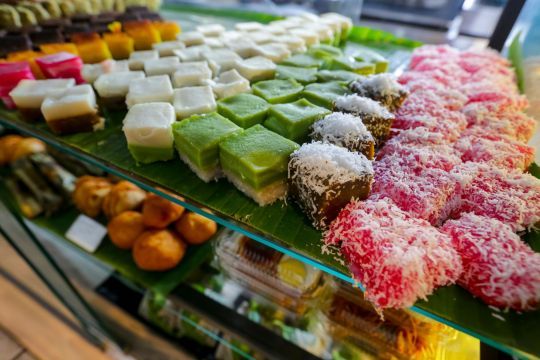
ALSO! In Singapore, during Ramadan, there is a huge Night Market in Geylang. Not only in Geylang there is a night market but this is very popular. There are MANY stalls selling food. Everyone who buys from geylang night market knows Ramly Burger, deep-fried Oreos, vadai, KEBAB, DENGDENG. (I like to buy rolled ice cream and chicken kebab mmmm)
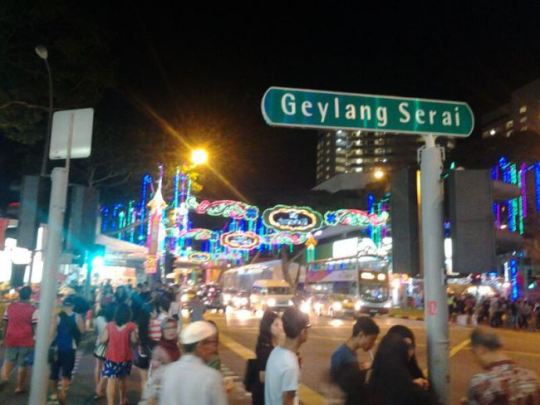
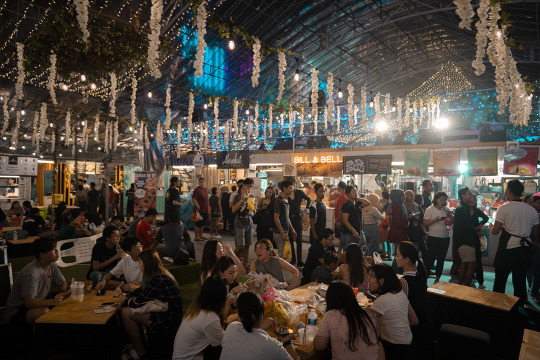
In Geylang too, they will buy traditional clothes to visit family. Baju kurung (ehh for traditional clothes, women wear baju kurung, men wear baju melayu but the names are the same anyway) is the normal clothing. Often, one household will choose to coordinate colors together (but it's not mandatory, lmao my family doesn't care)
For men, they wear songkok (that flat black hat) and samping (the long scarf wrapping around the waist)
For women, wear a sarong (skirt) with a long top. If desired, will also wear a tudung (type of hijab) (i should also clarify for muslim women its their choice whether they want to habitually wear hijab. its not just specific to just baju kurung. for example i have lots of aunties that dont wear hijab at all meanwhile i have a lot of aunts who do)

Baju kurung is also worn at other festivities, such as weddings


(my whole childhood I attended so many weddings, this is another topic lmaooooo)
On Hari Raya Aidifilti but before going to raya (this is what we generally call going out to see family), close family in will ask for forgiveness. (it's important the forgiveness is not one-sided, the adults will also ask forgiveness from the younger family members too). Usually this is when people start crying. After that, we go RAYA!!! When in someone else's house, if you are not working now, you can get duit raya! (because I grew up in singapore surrounded by chinese influence, I also call this "angpao" too)

OHHHH THERE IS A LOT OF FOOD;;;; My grandmother would cook a lot during Ramadan and Hari Raya. Rendang, lontong, KETUPAT OHHH KETUPAT, CHICKEN CURRY (my mother every aidifitri cooks green chicken curry, FOR HARI RAYA AIDIFITRI ONLY, ohhhhh that's my favorite part, ASBFKASB I'M HUNGRY.)

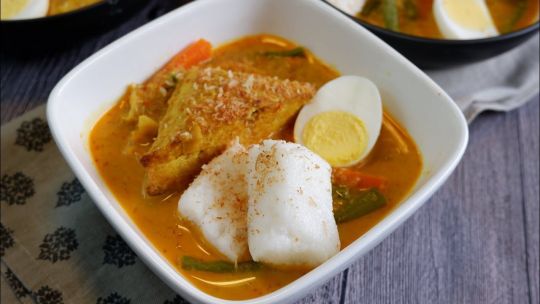
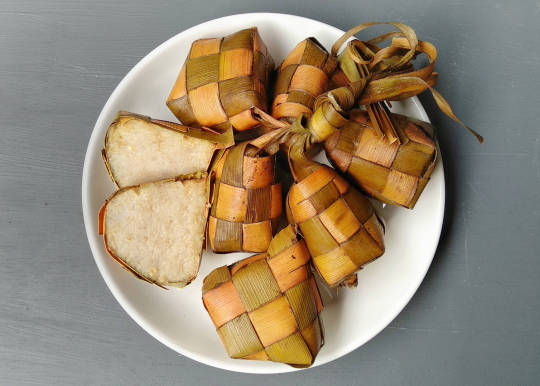
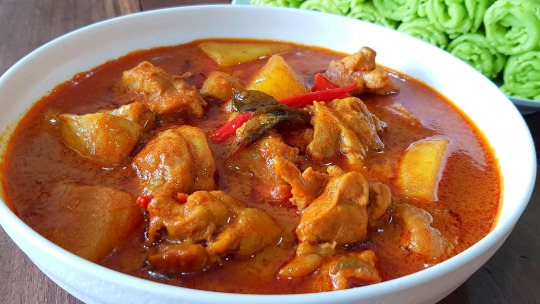
(theres also like way more cuisine than this, iu havent even mentioned nasi goreng and nasi lemak and briyani and FUCKIGN BEGEDIL;;;;)
ketupat is kind of icon to represent Aidifilti holiday, for example:

other icons of hari raya include: bunga api, neon string lights, bamboo torches, etc.
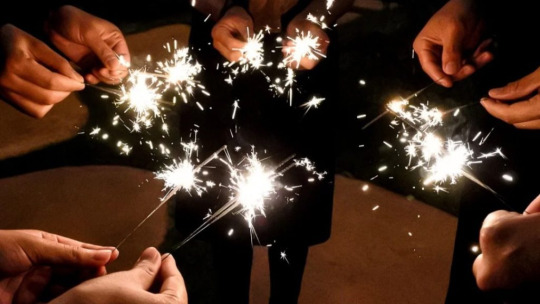


I love Hari Raya even thoug my feet hurt ALOT after visiting LOTS OF FAMILY AND FRIENDS OH MY GOD:;; it's okay if you take your shoes off in the house somehow your FEET WILL HURT at the end of the day;;;;;;
uhhhh others about malay culture? we have art! A martial art is silat melayu! I don't know much about this but it's great
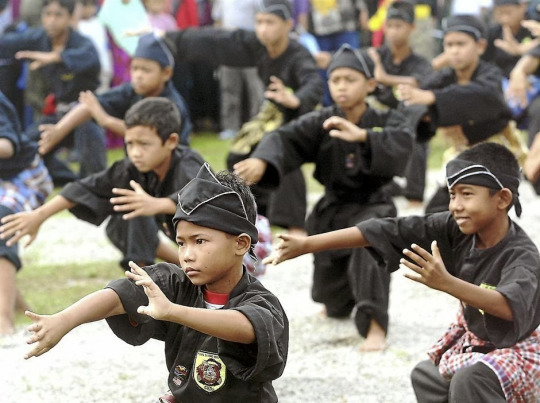
there is performance art: one example is dikir barat
youtube
juga ada permainan, ada yang terkenal ialah wau (kite)
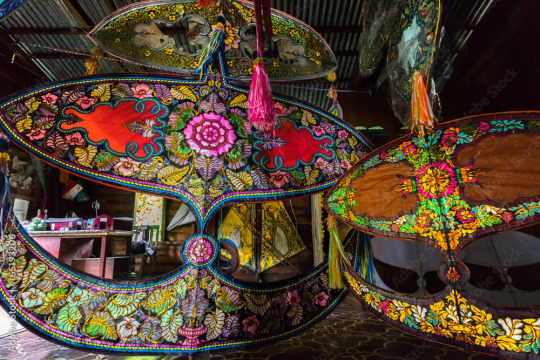
and congkak (like that one club penguin game, mancala, im not kidding)
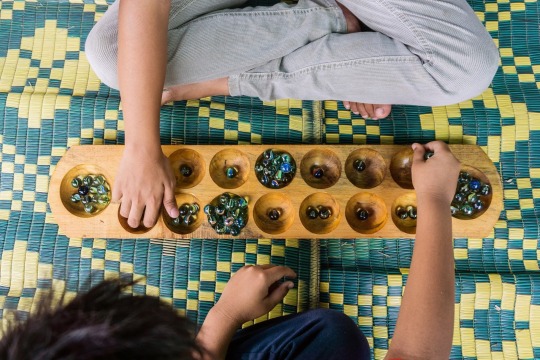
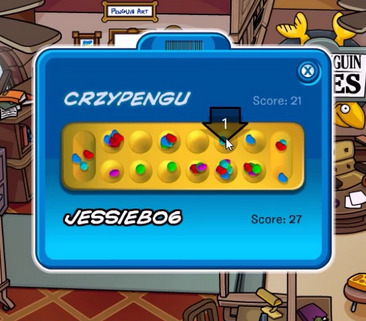
there are many malay cultures that are also from indonesian culture because of its influence. (Mainly malay culture was influenced by its neighboring cultures such as from Thailand, Sumatra, Java. Malay culture were from Hinduism before then converting to Islam) That's why we have wayang kulit (natively from Java) (a lot of indonesian culture and malay cultures share similar things because of kinda their similar roots and their spread of their own culture, hence why we also have similar dishes, traditonal clothes, even our language is kinda 70% the same)

Do you know; Singapore was discovered by Sang Nila Utama and was originally Malay kingdom (at that time the island was called Temasek before it was owned by the British) (the original indigenous of Singapore are called Orang Laut, litterally translated to "people of the sea"). That is why in Singapore, the language and the national anthem (Majulah Singapura) is in Malay. Singapore is not only for Chinese people, we Malays and Indians are also here;;;
(and im not at all from malaysia god please none of my relatives are. Malaysian is referring to the country, Malay is the language and the ethnic group)
There's a whole lot more I haven't even touched on, like lmao there's a whole thing about weddings and a whole baby shower thing.
theres also a lot of singaporean stuff i want to share i haven't even mentioned singlish but thats a post for another time
58 notes
·
View notes
Text
Guys. Guys! GUYS!!! GUYS!!!!!!!
✨SELAMAT HARI MEDEKA! ✨GUYS!!!!
💙💛❤🤍❤🤍❤🤍❤🤍❤🤍❤🤍❤🤍
( SONG : Saya Anak Malaysia 2020 (Malaysia Day Song) )
💙💛❤🤍❤🤍❤🤍❤🤍❤🤍❤🤍❤🤍
GIVING SOME LOVE FOR THE SEPAK TAKWAR TRIO, THE ACES!!! (WHO ARE CANONICALLY MALYSIANS! LET'S GOOOOOOO!!!!!!)
(At least, I think they are- WELL, THEY ARE TO ME!! LEAVE ME BE TO BE HAPPY-)
🎉🎉🎉🎉🎉🎉🎉🎉🎉🎉🎉🎉🎉🎉🎉🎉🎉🎉🎉🎉🎉🎉🎉
HAVE I MENTION IS MALAYSIA'S 67TH INDEPENCE DAY??? :D
SELAMAT HARI KE-67 KEMEDEKAAN MALAYSIA TO ALL MALAYSIANS IN THE SUPA STRIKAS COMMUNITY, AND AROUND OR OUTSIDE MALAYSIA!!! Hope you all are having a GREAT DAY ON THIS SPECIAL OCCASSION (ALSO MONTH AND YEAR!) regardless what you're doing!!! (This goes to people who aren't Malaysians too. You deserve great days in your life, like the rest of us!) ✨💛💜💛💜💛💜💛✨
🎉🎉🎉🎉🎉🎉🎉🎉🎉🎉🎉🎉🎉🎉🎉🎉🎉🎉🎉🎉🎉🎉🎉
I REWACTHED "SEPAK ATTACK S6E4" FOR THIS. CAN YOU TELL???? ALSO:

They REALLY name the Stadium that held the Sepak Takwar Event, "STADIUM MERDEKA"- Which just translates to:
"INDEPENDENCE Stadium"- (Edited after correction!)
"Merdeka" literally just means "Independence" in Bahasa Melayu-
Kinda ironic and an coincidence for today- And because Animasia Studios is from Malaysia. I wonder if this the people from Animasia Studios decision, or the writers/concept artists outside Animasia to name the stadium that.
This isn't really important- But I've been thinking this since I first watched and notice it in "Sepack Atack S6E4".
🎉🎉🎉🎉🎉🎉🎉🎉🎉🎉🎉🎉🎉🎉🎉🎉🎉🎉🎉🎉🎉🎉🎉
(GOING TO BE VERY PERSONAL IN THIS PARAGRAPH-) I will say, it took me awhile to accept my nationality self when I was younger, because always grow up thinking, "You're only special and stand out if you were "English", from a country that is Native Language is English, or any other country that isn't in Southeast Asia." But growing up and surrounding myself with loving and accepting people, I slowly accept myself and falling in love with this country again, despite of it's many flaws.
Malaysia isn't a perfect country, that's the truth. There are many things I would criticize so Malaysia can be a better, safer and inclusive country. In my opinion, I think it's getting better (at least I hope it is-), so I hope it will continue getting better on, in the future. But, of course, despite the terrible things that happens in Malaysia, my love is always towards the people, culture, ecosystem, etc. of this country. And nothing would change that. ✨💙💛❤🤍❤🤍❤🤍❤🤍❤🤍❤🤍❤🤍✨

( This is my artwork, of me, btw :) )
🎉🎉🎉🎉🎉🎉🎉🎉🎉🎉🎉🎉🎉🎉🎉🎉🎉🎉🎉🎉🎉🎉🎉
Originally, I wanted to make a drawing for the "Sepak Takwar Trio", with them wearing traditional clothing from different cultures in Malaysia (Pretty much Headcanons for them). Unfortunately, I don't have time... So I decided to make a little short edit of them instead! ✨💛💜✨ (I'M SO SERIOUS AND UNSERIOUS WHEN I MADE THE EDIT YESTERDAY- 😭😭 ) Maybe next year I will do the drawing 👀👀
Like I said, SELAMAT HARI MEDEKA!
💙💛❤🤍❤🤍❤🤍❤🤍❤🤍❤🤍❤🤍
#supa strikas#supastrikas#supablr#supa strikas the aces#malaysia#merdeka#SELAMAT HARI MEDEKA!!!!#💜💛 Made By MimpiNightmare 💛💜
27 notes
·
View notes
Text
The moment Rayer lost to Rosol over Bahasa Melayu
A debate in Parliament over the BERNAMA (Amendment) Bill 2024 turned heated when RSN Rayer (PH-Jelutong) pushed for greater emphasis on news in Chinese and Tamil. However, Datuk Rosol Wahid (PN-Hulu Terengganu) argued that Bahasa Melayu should remain the priority as the national language fosters unity among Malaysians. He emphasized that while other languages are important, prioritizing them in…
0 notes
Text
Do Memes Provide a Useful Way of Understanding Politics?
Introduction
Today, memes are more than just funny pictures. They have become a powerful way to discuss politics. You might have seen a meme that made you laugh or annoyed you while thinking about a political issue. However, memes can be more complicated than they seem.
Do memes help us understand political discussions? This is an important question. Richard Dawkins created the term "meme" in his book The Selfish Gene in 1976. He described memes as cultural ideas that can change and spread. Now, with social media, memes spread quickly and can influence how we think and talk about politics.
Memes can simplify complex topics and make them easier to relate to. However, they can also overlook important facts or spread false information. It’s important to think about whether memes help us understand politics or if they confuse us.
As we interact with memes, we should look closely at the ones we see and share. In a world full of information, it’s essential to tell what is true and what is not. So, the next time you see a meme, think about its message and how it contributes to the larger political conversation. In the age of memes, we are sharing more than laughs; we are also taking part in a new way to talk about politics that deserves thoughtful consideration.

The Role of Memes in Politics

In today’s fast-paced digital world, memes have emerged as a unique and influential tool in the realm of political communication. Especially when it comes to engaging young audiences who often find traditional news media less appealing, memes serve as a bridge.
They’re catchy, relatable, and often laced with sarcasm qualities that resonate with teens and young adults scrolling through their feeds.
Platforms like Twitter, Instagram, and TikTok have become information hotspots, and memes are virtually everywhere, making them some of the most entertaining forms of news. The most effective memes manage to be both humorous and thought-provoking, sparking discussions about important political issues. As highlighted in research by Kasirye (2019), a well-crafted meme can capture attention and invite users to engage in conversations that they might otherwise overlook.
In a landscape inundated with content, the reality is that our attention spans are shorter than ever. People crave quick, digestible nuggets of information that provide insight without the weight of lengthy articles. Memes fit perfectly into this “cookie jar” of content educational yet enjoyable, easy to consume, and straightforward in delivery.
This meme phenomenon is crucial, particularly for individuals who feel disconnected from traditional political discussions. According to Shifman (2014), memes can effectively disseminate vital information about political issues and events, acting as a catalyst for engagement and understanding.
In essence, the future of political communication may not be found in lengthy speeches or dense articles, but in the clever, humorous world of memes. They provide a valuable avenue to inform, engage, and inspire the next generation of voters. So, the next time you come across a meme, remember it might just be the spark that ignites a much-needed conversation about the issues that matter most.
Simplified Political Messaging
In today’s political landscape, messages can often feel bogged down by jargon and complex information, making them seem inaccessible to many. One effective way to simplify these messages is through memes.
A prime example of this was during the Movement Control Order (MCO) in Malaysia, where numerous government announcements were made in Bahasa Melayu. For those who didn’t understand the language, these communications could be quite frustrating. However, memes emerged as a clever solution, transforming complicated information into relatable, humorous content that resonated, particularly with younger audiences.
Memes do more than just entertain, they can spark important conversations around political issues. When a meme goes viral, it often ignites discussions that can lead to a deeper understand ding of current events. This presents a unique opportunity for political figures to engage more effectively with the public. By embracing memes, they can create a more inclusive environment for political dialogue.
In essence, humor and relatability in memes can draw people into political conversation, making the sometimes dull agenda of politics much more engaging.
Impact of Political Memes

At the time of elections, memes seem to be more powerful than at other times. As an illustration, the decision of Malaysia at current for the sake of reducing voting age from 21 to 18 shows how memes can influence political attitudes of young voters. There are many among the young who do not possess a proper grasp of political matters and hence resort to memes for believed facts about candidates. Memes might help get people to connect more emotionally, and at the same time, they can help become politicians seemingly more human and hence more relatable. An entertaining meme that is a portrait of a candidate could humanize them thus making it more likely for young voters to feel connected with their messages and platforms (Kasirye, 2019).
Going back to the 2008 US presidential campaign, Barack Obama's team cleverly used memes to catch the attention of young voters. The increasing attention to his bid was further intensified by memes that showed the rockstar in the office and his platform (Oakes, 2020). This relationship between memes and political participation highlights their ability to shape election results and to a large extent, among the younger group.
However, we must know the fact that memes always may not have a good influence. While memes can give information and, hence, captivating and instructive, they can also forge errors by passing false data and biases. Since memes often feature exaggeration and humor, it may not be apparent where the truth stops and the satire starts. Hence, it leaves people the responsibility of being critical in their interaction with the same (Vajpeyi, 2024).
Conclusion
Memes and politics are linked. They engage people, especially younger audiences, by simplifying complex issues with humor. However, memes can spread misinformation and reinforce biases. When used wisely, they can enhance political discussions and encourage civic engagement. In short, memes can influence political conversations. Consider their impact before sharing.
References
Dawkins, R. (1976). The Selfish Gene. Oxford University Press.
Kasirye, F. (2019). THE EFFECTIVENESS OF POLITICAL MEMES AS A FORM OF POLITICAL PARTICIPATION AMONGST MILLENNIALS IN UGANDA. Journal of Education and Social Sciences, 13(1). https://www.jesoc.com/wp-content/uploads/2019/08/KC13_032.pdf
Oakes, A. (2020, October 26). How has social media changed the US presidential election? New Digital Age. https://newdigitalage.co/social-media/how-has-social-media-changed-the-us-presidential-election/
Shifman, L. (2013). Memes in Digital Culture. The MIT Press. https://doi.org/10.7551/mitpress/9429.001.0001
Vajpeyi, A. (2024). Role of Memes in Modern Political Discourse: The Evolution of “Pappu” | NewsClick. NewsClick. https://www.newsclick.in/role-memes-modern-political-discourse-evolution-pappu
0 notes
Text
Experts say native language of Mendriq Orang Asli in Kelantan could become extinct in 20 years
The Mendriq Orang Asli community in Malaysia is at risk of losing their ancestral language due to the influence of formal schooling and mixed marriages, with language experts warning it could become extinct within 20 years, jeopardizing an important natio
via Malay Mail, 26 June 2023: The Mendriq Orang Asli community in Kelantan, Malaysia, is facing the risk of losing their ancestral language as younger generations increasingly prefer to use Bahasa Melayu, the national language, due to the influence of formal schooling and mixed marriages; language experts warn that without serious efforts to preserve the language, it could become extinct within…

View On WordPress
0 notes
Text
Heyy!! If anyone is wanting a penpal or someone to snailmail, always know that my DM is open! You can check the FAQ on my Tumblr website for more questions!
Please note that I'll most likely accept those who are:
• around 14-17 years old.
• there are no specific preferences I'm looking for! Just go and have fun!
Small note for peeps:
• I live in Malaysia, so the snailmail might arrive a bit late
• I am fine with language exchange if you're wanting to learn English or Bahasa Melayu/Malay more!
• We won't be sharing addresses if you're not consenting to it or don't feel ready yet to share
• Those that want to snailmail but aren't within my age range are still accepted! But if you're uncomfortable with it, always let me know! Your privacy and consent are important to me.
My DM is always open for people to request penpalling and snailmailing with me!
4 notes
·
View notes
Text
Bahasa
Bahasa is a funny thing. It literally means ‘language’, but when I hear people use it in the context of the name of a language, they mean Bahasa Indonesia, or Indonesian-Malay.
But Bahasa Melayu[1] is also a thing. Ask the Malaysians, Singaporeans, and Bruneians.
Regional variations aside, the two are almost the same[2]. Similar enough that a Malay-speaker could converse with an Indo-speaker, but different enough that occasionally there will be some words that just don’t work. My Malay is limited to the essentials[3] but I have been informed by my Indo friends that there are a handful of words which are completely different in meaning and some with variations in nuances.
There is also the minor issue where names for food are also same-same, but different. Don’t think that just because you know what a food item is in Malaysia, that if you ask for it in Indonesia that it will come out as you expect. Sure, it probably will most of the time, or it might have a little twist that you are unfamiliar with. Learn to be adventurous with your food.
One language-related experience I will always recall is when our friends went to Jakarta for another friend’s wedding. For convenience, group transport was organised to get us around.
On one such drive, one of my oldest friends, also Malaysian, stared thoughtfully out the window. Suddenly, her eyes lit up and she exclaimed, “Oh! It’s a hospital!”
She had seen a building marked rumah sakit. In Malay, rumah means ‘house’, and sakit means ‘pain’, so for the last minute she was trying to figure out what 'house of pain’ was.
I laughed because that perplexed me as well, and hospital was absolutely not where my brain went and the odds of that direction of the size of that building in that country was nigh on negligible.
An Indonesian friend laughed and replied, “Yes, it’s a hospital. Why, what it is in Malay?”
In unison, my Malaysian friend and I replied with a Malaysian accent, “Hospital”[5].
--
[1] Bahasa Inggris is English, for example.
[2] @disoriented has reminded me Indonesians also speak very quickly compared to Malaysians.
[3] Food and beverage, hygiene, and a few extra words and phrases[4].
[4] As the Malaysian immigration officer who noted the difference between my passport and my accent remarked after asking me if I speak the native tongue, “At least you know the important words.”
[5] I haven’t checked the etymology, but assume this was because of the British colonial influence in Malaysia and we adopted English words into Malay the way you’ll find Dutch words in Indonesian.
12 notes
·
View notes
Photo

Week 3 Reflection and my experience with letter forms
Having to study more than 4 languages before made this week’s topic very interesting to me: letter forms. I especially enjoyed looking back at my past and studying languages such as Chinese, Jawi (arabic), French and Bahasa Melayu (malay) in my middle/high schools. Chinese is my favourite not only because it is my mother’s tongue but also how it has purpose and meaning in each chinese character. In the image I have created above shows how words such as mouth and people came about. I added the stroke order as it has importance to the meaning of the word (eg: guó).
Moreover, having to reflect back on the beginning of how the power of writing came about shows its importance in communication throughout in human society. It is how we are able to understand the what has happened in the past as it is passed down.
7 notes
·
View notes
Video
youtube
Speech made by Singapore’s Prime Minister Lee Hsien Loong today to announce the new restrictions for Singapore. We’re finally going under lock down like the rest of the world.
Transcript:
My fellow Singaporeans Good afternoon
I last spoke to you on COVID-19 three weeks ago.
Since then, the number of new cases daily has begun to rise. We used to see fewer than 10 new cases a day. But in the last two weeks, despite our best efforts, we have routinely had more than 50 new cases daily.
Initially, many of the new cases were imported from overseas, mostly returning Singaporeans. Then last week, we began to have more local cases. Furthermore, despite our good contact tracing, for nearly half of these cases, we do not know where or from whom the person caught the virus. This suggests that there are more people out there who are infected, but who have not been identified. And they may be passing the virus unknowingly to others.
In the last few days, we have also discovered several clusters at foreign worker dormitories, and one at a nursing home. These are very worrying, because large numbers of people live together in dormitories and nursing homes. A single case can quickly lead to a large cluster. Furthermore, nursing home patients are mostly old and frail, and very vulnerable to the virus.
As the situation developed over the past weeks, we have tightened our safe-distancing measures progressively. Singaporeans have responded well, calmly and responsibly, and made adjustments in their daily lives. By working together, we have kept the outbreak under control.
But looking at the trend, I am worried that unless we take further steps, things will gradually get worse, or another big cluster may push things over the edge. I discussed this with the Multi-Ministry Task Force (MTF). We have decided that instead of tightening incrementally over the next few weeks, we should make a decisive move now to pre-empt escalating infections. We will therefore impose significantly stricter measures. This is like a circuit breaker. It will help reduce the risk of a big outbreak occurring. And it should also help to gradually bring our numbers down. This in turn will allow us to relax some of the measures. This circuit breaker will apply for one month, in the first instance. The Task Force is holding a Press Conference immediately after I finish speaking to you to explain the details. But let me give you the key points.
Continuation under the cut
First, we will close most workplaces, except for essential services and key economic sectors. Food establishments, markets and supermarkets, clinics, hospitals, utilities, transport and key banking services will remain open. These are essential services. We also should not disrupt economic sectors that are strategic, or form part of a global supply chain. People working in these industries can continue to go to work, with safe-distancing measures in place. But most other work premises must close. If the person can work from home, he should do so — telecommute. But others will not be able to, including foreign workers on construction sites and in shipyards. These workers live in dormitories, and we will make arrangements to look after them. The closure of work places will take effect from next Tuesday. This will ensure that most of our workforce stay at home and limit their physical interaction to as few people as possible.
Second, we will also move to full home-based learning in our schools and Institutes of Higher Learning (IHLs). We started with one day of home-based learning this week. This has gone smoothly, with some teething issues being resolved. The Ministry of Education (MOE) will work with the schools to implement full home-based learning starting next Wednesday. All preschool and student care centres will also be closed, but will provide limited services for children of parents who have to continue working and are unable to make alternative care arrangements.
Third, we will tighten restrictions on movements and gatherings of people. It boils down to three things. First, stay at home, as much as possible. Second, avoid socialising with others beyond your own household. Gatherings should be confined to your household. Avoid visiting even your extended families who are not staying with you, especially if they are elderly or vulnerable. Third, go out only to do essential things. For work, if you are in essential services or key economic sectors. To buy food at markets, or to take out from restaurants and hawker centres. Or to exercise in the neighbourhood park, keeping a safe distance from others.
The spirit of these measures is to get all of us to minimise physical contact. If we do not go out, if we avoid contact with others, then the virus will not be able to spread. It is as simple as that.I know this is very hard to do. As a practical matter, in places like hawker centres and wet markets, it is difficult to practise safe-distancing, especially on the weekends when it is crowded. It will help if we all adjust our habits. For example, do our marketing on weekdays instead of weekends to avoid the crowd. We will also deploy more Safe-Distancing Ambassadors to encourage people not to crowd together, so please cooperate with them.
Safe-distancing is also hard for a psychological and emotional reason: it goes very much against our human instincts. It is in our nature to want to socialise, to be close to those we are talking to, to take comfort in the warmth and company of friends and family. I fully understand this. But I hope you will also understand why we all have to take social distancing extremely seriously in this period. This is the only effective way to slow the transmission of the virus, so that we gradually bring our numbers down. It is also the best way to keep our families safe, and particularly to protect our seniors from getting ill. So please bear with the painful adjustments that we have to make. Each and every one of us can, and must do our part, to keep everyone in Singapore safe from COVID-19.
Let me now say a few words in Malay and Mandarin.
[repetition of the above in Bahasa Melayu and Mandarin. Full transcript available Here]
I decided to speak to you directly today to explain why we need to make this major move now, but also to reassure you that things will be alright. Essential services will continue running so that all of us can cope in this new situation, as we batten down to fight this virus. We have enough food supplies to last us through this period and beyond. You can still shop at the supermarket or wet market. And you need not rush to stock up for weeks at a time. You can still buy food from your favourite hawker centres or coffee shop, though you will have to take out and eat at home with your own family, rather than hang out and eat outside with your friends.
I know these measures will impact our workers and businesses severely. This is already a very difficult time for them. We will help them come through this. On Monday in Parliament, DPM Heng Swee Keat will announce additional support for households and businesses, over and above what was provided in the two earlier Budgets. We will also legislate to require landlords to pass on property tax rebates fully to their tenants. We will also pass new temporary legislation to let businesses and individuals defer certain contractual obligations for a period, such as paying rent, repaying loans, or completing work.
Besides implementing this circuit breaker, we also are rethinking our advice on face masks.
Up to now, the Government has advised the general public that you only need to wear a mask if you are not feeling well, and this is to protect others from your germs. This was based on scientific advice and guidelines from the World Health Organization (WHO). We also did not have community spread in Singapore then, so it was very unlikely for you to run into anyone with COVID-19 on the street, much less be infected by them. Nevertheless, the Government gave each household four surgical masks, to use in case you got sick, and to give people peace of mind.
Now, the situation is changing. We now think there are some cases out there in the community going undetected, though probably still not that many. We also now have evidence that an infected person can show no symptoms, and yet still pass on the virus to others. This is why the WHO is reviewing the issue of face masks, and so is the US Centers for Disease Control and Prevention (CDC).
Therefore, we will no longer discourage people from wearing masks. Wearing a mask may help to protect others, in case you have the virus but do not know it. This is so that you keep your droplets to yourself — when you sneeze or speak or cough. It can also protect yourself a little better, especially if you are elderly, or vulnerable because of pre-existing health conditions.
We still want to conserve surgical masks for the people who really need them – healthcare workers in clinics and hospitals. For everyone else, in a community setting, alternatives like reusable masks will give some added protection. So from this Sunday, the Government will distribute reusable masks to all households. Meanwhile, many community groups have been making and distributing reusable masks for the elderly and vulnerable. I applaud these efforts. They show our community spirit and mutual care.
But remember, mask or no mask, you still need to wash your hands, and keep a safe distance away from other people.
The next few weeks will be pivotal. Even after these stepped-up measures, the number of cases will quite likely still go up in the next few days. They can be cases who have already been infected earlier, except they have not yet shown symptoms, or not yet gone to see their doctor. But if we keep our efforts up, within a few weeks we should be able to bring the numbers under control, bring the numbers down, and get into a more sustainable position.
We will keep on doing our utmost to protect every Singaporean from COVID-19. Many people have been working tirelessly for the past two months — our nurses and doctors, our contact tracers and healthcare staff. We thank them all for their efforts and sacrifices. Now we are all enlisted to join them on the frontline.
It will be a long fight. But if any country can see this through, it is Singapore. We have the resources. We have the determination. We are united. By helping one another through this, we will prevail, and emerge stronger.
Thank you.
#Singapore#coronavirus#covid-19#sorry this is not my usual blog content but it's important#also is it weird to be proud of a speech?#I am still pissed off at my govt for reasons unrelated to this#but Look! At this! Beautiful piece! of Risk communication!#This is the kind of speech we've been getting all this while#And it's just#So well written#If nothing else#my govt knows how to do risk communication lmao
6 notes
·
View notes
Text
Open Doors celebrates the completion of 101 archive imports since 2012!

OTW's Open Doors project celebrates the completion of 101 archive imports since 2012! Visit the link to see which archives have recently been preserved at AO3 and maybe find some new favorite fanworks! Read more at https://otw.news/4sa
Bahasa Melayu • বাংলা • català • dansk • Deutsch • English • español • français • italiano • magyar • मराठी • Nederlands • polski • português brasileiro • português europeu • Română • Русский • slovenčina • suomi • svenska • Tiếng Việt • Українська • 中文
524 notes
·
View notes
Text
The Otter

Here’s a -- personal essay, I guess? I performed this 22 November 2019 for Sweatheart, a monthly-ish storytelling night held at Lit Books.
The night’s theme was “tomayto! tomahto!”, so I thought I’d talk about language. And also otters.
+++
THE OTTER
There is an animal in my head. It is an otter.
Did you know that we have otters, here? There are several species native to Malaysia. I didn’t know this until about three years ago! I’d known of the Malay word “memerang”, and that it meant “otter”, but never consciously made the connection --
“Memerang” means “otter”.
Anyway. There’s an otter in my head. I can see her so clearly: her brown-black coat, wet and sleek; her whiskered face, her webbed feet; she chirps and she sings and she wants to slip onto a fisherman’s boat, wants to steal some bait, wants then slip away again.
She peers through my eyes. She cannot squeeze through. She paws through the cage-door of my teeth. She cannot lift the latch on my mouth. She starts to run in a panic -- circles-circles -- a trapped animal. Rattling, shaking my skull. She screams.
The otter, trapped; the otter that cannot get out --
For me, this is what writing and speaking in Bahasa Melayu is like.
+
Hi. I’m Zedeck Siew. I’m a writer from Port Dickson. I write fiction; with my partner the visual artist Sharon Chin, I wrote a book called “Creatures of Near Kingdoms”.
“Creatures of Near Kingdoms” is a bestiary, a herbiary: a collection of seventy-five animals and plants I imagine living in Southeast Asia.
I write in English -- it is my first language -- so the book I wrote is in English. But I’d originally dreamed of it as a bilingual work. Early this year, I applied for -- and received! -- a small grant, to translate Creatures of Near Kingdoms into Bahasa Melayu.
I decided to translate the book myself. This was not the smartest decision, in retrospect? I am now four months past my original deadline. I am stuck.
I have had seventy-five otters in my head. Some of them still cannot get out.
+
It is not like I don’t know Bahasa Melayu. I went to kebangsaan school.
But, like many urban, non-Malay middle-class persons: done with SPM, I would head to college, or maybe uni overseas -- actually I just started working here -- the thing is, I thought I was going places.
I put the otter into the carrier cage of my head. I wanted to travel, you see?
And I do travel. Australia and Singapore, where my siblings now live --
But also from Subang to Taman Tun to Damansara Heights to Uptown; from neighbourhood, to mall, to cafe, to bookstore. From Twitter to The Guardian to n+1.
If you are of a particular background, of a particular class, you can live on English alone.
You don’t need Bahasa.
+
It’s not like school prepares you, anyway.
The basics of Bahasa Melayu are easy. But so much of common-use Bahasa is context as much as text. There are no tenses, so time is less obvious. And the pronoun “dia” could refer to a person of any gender; an animal; an object.
Spoken Bahasa is all about efficiency: “Makan? Makan? Makan.”
Written Bahasa tends to run-on sentences, a half-dozen clauses linked together, stringing disparate thoughts along, charting orbits instead of straightforward meaning.
It is a quickly-evolving, shifting thing. A language of cues. And, exactly for this reason, if you don’t use it every day?
Very easy to tell.
Aku switch kejap ke BM. Bagi korang dengar BM aku ni macam mana. Rasanya dulu kat sekolah BM aku macam ni lah. Tapi even now bila aku dengar kata-kata yang keluar mulut aku ni, aku rasa tak sedap. Tak petah. Either sebab gagap, or skema sangat.
Just so -- so poyo!
When I locked up my otter it was so very easy to lose the key.
+
The question then is: why? Why Bahasa?
Why not stick to English? It is the language of success, after all. It will get you anywhere that matters.
It is an advantage. Why take the trouble, just to be at a disadvantage? To be vulnerable?
Not being proficient in the tongue of your homeland is embarrassing. I’ve had people laugh at me, judge me. Kata Orang Malaysia. Tapi cakap Bahasa Malaysia tak boleh.
The language divide is a chasm. It shelters ethnic and material resentments. Ultra-nationalists say that those who cakap omputeh are traitors.
I’m sure most people in this room have, at some point or other, sniggered at the broken English of a Vernacular or Kebangsaan Ed person.
I still get cabbies and Grab uncles asking me: “You don’t speak Chinese? You not Chinese? Why you not proud of being Chinese?”
Like an apartment cat, like a loris in a zoo -- it’s safer inside, dear otter. The air is air-conditioned and the bars are plexiglass.
+
Amat mudah untuk berpidato; mengangkat senjata kata-kata:
“Jurang antara Bahasa Inggeris dan Bahasa Melayu adalah jurang antara bangsa, dan juga antara kelas. Ia membahagikan masyarakat kita kepada puak-puak kecil yang makin lama, makin hilang upaya untuk bertegur sapa sesama sendiri.
Menjadi tanggung-jawab setiap warga Malaysia untuk merentasi jurang ini. Membina jambatan di antara hati-hati dan minda-minda yang kian lama bercanggah. Menjadi kewajiban kita!
Sanggupkah kita menyahut seruan ini? Mengambil langkah menyelamatkan negara tercinta?
Ayuh -- berjuang!”
+
Tapi aku tak ingin berjuang. Aku hanya ingin pecah kunci sangkar kepala aku ini. Lepaskan memerang yang terjerat.
I hear her scratch whenever I talk to my gardener, to the Indonesian auntie at the warung, to the Bangladeshi cleaning the mall lavatory, using the lingua -- the bahasa -- of the working class.
I hear her whimper when I switch to BM to speak to Immigration; the abang polis; the kakak at the post office. Language deployed as a cynical simulation of kinship, to make my life easier.
I don’t know whether you have an otter. I only know that I do. I locked her up: for her safety; because it was simpler. Through my eyes she sees the green and the birds of the place she was born.
I feel her hands touch the inside bone of my skull -- touch, touch, touch.
Telling me she wants to be free. To chatter with her children. To eat fish she catches herself. To swim in the waters of her home.
+++

I’ve spoken about writing in and translating Bahasa Melayu, before -- why I think it’s an important thing to do; what I think it means, to be a multi-lingual writer in Malaysia --
Before this, it’s always come off as a bit self-righteous. A little lecture-y?
But I think I’ve got it, now. The most truthful way to talk about Bahasa is to talk about my relationship to Bahasa.
What it’s like. How I see it. How difficult I find it, how bad I am at it. How badly I want it. How badly I want the vulnerable animal in me to be free.
(Photo by Lainie Yeoh)
24 notes
·
View notes
Text
8 Things I Wished I Knew Before PT3 (2019)
Whew, 2019′s almost over. This was one wild ride of a year for me, as I sat for my first standardized exam in high school. I was also the first batch to sit for the new format of PT3.
This year taught me a lot, especially about being a better student. If only I could go back in time and told myself the things I’ll be saying now – I wonder if anything would’ve changed...
Oh well. The past is in the past, and there’s nothing I can do about that. What I can do, however, is to share what I wish I knew before I took PT3. Whether you’re a senior who’s just curious, or a junior anxious about taking PT3, I hope that this can bring some sort of benefit to you.
1. Keep a positive mindset.
It was easy for me to blame the Ministry of Education for not updating us on this format early on. It was easy to whine about how it was unfair that everything was uncertain, and how even teachers didn’t really know what to do.
Complaining is easy, but it won’t get you straight As.
Instead of blaming your failures/anxieties on others, divert that energy into positivity for yourself. Start planning out how you’re going to study, how you’re going to achieve your goals. You’re gonna have to suck it up and buckle up to get work done if you really want great results.
2. Be on top of organisation.
I had a pretty good organization system already, but I felt like this was important to highlight for future PT3 takers.
Having a good organisation system is essential for students. Our brains are already messy enough, so having a system that organises your physical schoolwork is extremely helpful. I daresay that my organisation saved me throughout the year.
I had a folder with 8 sections – one for homework that was due, one for homework that was done, one for my mental logic subjects (math, science, asas sains komputer), one for my earth logic subjects (pendidikan Islam, geografi, sejarah), one for languages (bahasa melayu and English), one for random letters related to school and one for stuff related to extracurricular activities.
Organisation is also extremely important for when you begin your kerja khusus/coursework in the middle of the school year. If you can, store your files related to kerja khusus both online and offline so it can be convenient for you, especially for asas sains komputer students. This way, you can work on your coursework even after school.
I’ll make a post about my coursework experience and tips later on.
3. Cover all the Form 1 and Form 2 topics early on.
And by cover I mean, have a solid foundation and understanding on those topics. Yes, not every topic will come out in the paper, but it’s important to be well-prepared, no matter what.
To do this, list out all the chapters in every subject for Form 1 and Form 2. Plan out a study schedule which will lead to you covering all the chapters before your midterms – within, say, five months.
For example, Sains Form 2 has 13 chapters. If you revise one chapter every Saturday starting from January, then you would be able to finish it by the end of March.
4. If you want to move to MRSM or SBP, focus on Mathematics and Science.
Yes, MRSM and SBP usually look for all-rounders, but they will be especially attracted to your application if you maintain an A in both Math and Science. That being said, don’t ignore Sejarah and Geografi just to focus on Math and Science.
5. Midterms is the deadline.
Trials aren’t considered proper exams anymore, but I think many schools still set a trials date to prepare their students for the coming exam. If you’re applying for MRSM or SBP, they’ll most likely ask for your midterm results instead of your trials result.
So you shouldn’t be playing around during your midterms like I did, and focus to do well. You can (and really should) take a breather for a week or so after your midterms.
6. Don’t fall for those expensive seminars.
I went to one that promised notes and support until PT3, but it didn’t really help lol.
Instead of shelling out RM100+ for those seminars, find a private tutor for the subjects that you’re having a hard time in/really want to get an A in. Going for tuition classes that has a small class size is also okay. Or you can badger your teacher for free. Find what works for you.
7. Make use of spaced repetition, the Feynman Technique and the forgetting curve
Whoa! What are all these weird terms? Worry not, my friend, for once you learn about the functionality of these terms, they will be extremely useful to you. I call them The Essential Triangle of Efficient Studying.
• Spaced repetition: allowing yourself to forget information for a while, then retrieving it so that you strengthen your knowledge of that information.
I would recommend Ali Abdaal’s video on spaced repetition, which you can watch here. Make sure to watch the first part too, and check out the rest of his channel.
• The Feynman Technique: if you truly understand something, you must be able to teach it to a 6 year old. Basically, teach yourself what you’ve learned in simple terms.
Here is another video on how to use the Feynman Technique. If you’re too lazy to speak to yourself like me, you can do this method of the Feynman Technique.
Read about what you want to revise. Now, close the book/put away your notes.
Take a sheet of paper. Write down what about you’re revising, as if you were teaching to someone else.
If you forget something, refer to the book/notes to remember it. But DON’T copy it word for word. Close it and put it away, then continue to write what you forgot about.
Repeat step 1 through step 3 again and again until you are able to write notes on the chapter without having to refer to anything.
• The forgetting curve: how long it takes for us to forget information.
Here is a graph of the forgetting curve.

Basically, you’ll forget 50% of what you learned within a day. To increase your retention, you have to intercept the forgetting curve. After you’ve learned something, try recalling about it before you go to sleep. Then, review it the next day. Afterwards, review it in three days. Review again seven days after the last review, and again 10 days after the last review.
The more time you spend intercepting the forgetting curve, the more you retain what you’ve learned.
The best way to use all three of these is by using traditional flashcards, or by using a Spaced Repetition System like Quizlet or Anki. Another fun way is to constantly quiz yourself with your friends – usually, my friend would be asking questions from the textbook, and the rest of us would fight to answer and get points. The loser with the lowest points usually had to belanja chicken nuggets.
8. Get your priorities and self-discipline straight.
If you want to get excellent results, you better start acting like a top student.
Spend less time with friends who aren’t academically inclined. Make a simple study schedule and stick to it. Hold off entertainment until you’ve finished studying.
Don’t overwork yourself, do a maximum 5 hours of revision on a weekday, 6 hours of revision on a weekend. Appoint a day in the week where you do the bare minimum in studying or don’t study at all, just for lazing about, working on hobbies, spending time with friends and loved ones.
Take enough breaks so you won’t burn out and get stressed. Life doesn’t end after PT3. Don’t dwell on mistakes, you have to keep learning from them and moving forward in this world.
That’s the reality of the world. And to think that we’re only 15.
Thank you for reading until the very end! I’ve been very blessed this year to learn a lot, not only inside the classroom, but about myself and life in general. PT3 was only a small portion of this year for me – but this post doesn’t really talk about that.
That being said, I’m grateful for everything that has happened this year. I’m grateful for my results, grateful for the people that have supported me, for the people who doubted me, too. Everything has taught me so much, and I want to cherish these memories and lessons until the very end.
If you’re taking PT3 soon, good luck! I wish you all the best. If you have any questions, don’t hesitate to send me a message in my inbox. I’m always happy to help, as long as you’re willing to learn.
3 notes
·
View notes
Text
To Speak English or Malay? Netizens Confused
There has been a debate regarding the language Malaysians should speak in. For the most part, users state that Bahasa Melayu is the language that we should communicate in. But others say that English is an international language that should also have its importance. To speak English or Malay? Jangan layan kak orang mcm tu. Twitter ni faham2 jelah ada puak terpaling pelbagai perkara. Lagi…
1 note
·
View note
Text
The Countdown: Worries and Expectations
I had just finished explaining instructions to my 6th graders - all four of them - as they proceeded in the Speaking portion of the ACCESS test. I returned to my desk and checked my phone to look at the time. My mouth gaped open as I read the introductory lines to an email sent from Fulbright. My co-teacher, sitting across from me, looked up concerningly. “Did you get it?”
We were on the edge of our seats for weeks whenever an email notification pinged. I had been named a semi-finalist at the end of January and it was now the third week of March. “You got it?”
I nodded eagerly, half in shock, half purposely remaining silent not to interrupt my students taking quite possibly the most important standardized test that would ultimately determine if another year of ESL would be necessary.
I had learned about Fulbright in high school while looking at study abroad programs. It seemed like everything that I had wanted to pursue - hold a prestigious English teaching position abroad, learn a language in the progress, and travel.
Five years later, I had achieved it. I would be teaching English in a secondary school in Malaysia for 10 months. What a dream - right?
I pep-talked myself for the next eight months, assuring that I was well-equipped culturally, socially, and educationally to assume a position 9000 miles from home. Sure, I have an advanced degree and experience in teaching ESL; I grew up speaking the national language, Malay or Bahasa Malaysia; and I have a firm grasp of the culture - traditions, customs, and peculiarities of the country. However as time went on, I saw many within my cohort - 99 other American ETAs from various racial, religious, and educational fields - with much more experience abroad, either working or for fun. Meanwhile, I had only applied for my American passport in the summer, shamefully knowing that this would be my first time outside of the United States since arriving in 1997. I was known for my love of languages and cultures and yet, I had never spent time abroad. With that in mind, of course there would be no better country to travel to first than Malaysia.
As I read more and more blog posts, curriculum materials from ETA Coordinators, and reflected on my time as male teacher of color working with CCKs (cross cultural kids) and English Language Learners, I realized that the experience I had envisioned was likely to be far from the reality. I remain proud to come to Malaysia as a Malaysian-American, knowing that there are not many of us in the United States (as most opt to move to Commonwealth nations like Australia and Canada), and that my unique perspective offers a cultural bridge between the two nations for better mutual understanding and relations. However, I also know that “white worshipping” is an unfortunate but widespread bias leftover from British colonialism. To quote a past Malaysian-American ETA, Shaina Mackin, “I have and will always move through time and space encountering perceptions based on my race. These perceptions bring with them expectations, most of which I have never been able to meet. I could not hide my genetic roots even 8,000 miles away from home; almost immediately upon arrival I discovered I would not be accepted as American without an explanation for my brownness.” I, myself, also had worries I would be treated as not being “truly” Malaysian enough and yet also not treated like many of my other American ETA cohort members.
Growing up in the United States and being the only Asian-American in my class up through middle school, I inadvertently have had to speak to topics related to my race whether genuine or stereotyped in fashion. I was always seen as Asian to my American (read: caucasian) classmates and teachers. It would seem logical to think that in Asia, I would be seen as American but perhaps not. I’m sure it will be surprising to many at my host school (as it already is in the US) when no tall, blond, blue-eyed “American” aptly named “Stephen CAMPBELL” is called up to introduce himself. The expectation for anything less other certainly baffles anyone bold enough to ask how I acquired such an “interesting” name [for myself] even though Campbell is the 40th most common name in the U.S. and Stephen continued to trend in the top 100 boy names through the 2000s.
Lastly, I look at my time as a teacher of color in America, priding myself on how I was able to build relationships with my students around (1) a shared interest and respect for their languages and cultures and (2) their social-emotional well-being - my Haitian students and I appreciating French music and letting them teach me the similarities between French and Creole; mentioning that I love (and more importantly eat) roti, a flaky flatbread, to an Indian student of mine during his snack time; exchanging pleasantries in Arabic to my Syrian and Yemeni students in the morning; and giving my Chinese students time to eagerly show me what they’ve learned during their weekend Chinese school. Even while teaching private enrichment, I distinctly remember being thanked by a high schooler who said that she appreciated having a teacher of color because she finally felt respected, listened to, and in turn, inspired to “help other minorities” just as I want to by teaching.
Can I assume this would translate over in Malaysia, considering that I keep up on new Malaysian music, drama Melayu, use the language frequently, and eat/cook Malaysian dishes. Sometimes, that’s all that we as 1st generation-hyphen-Americans can culturally participate in, fostered by our parents’ hope that it isn’t watered down by assimilation. Perhaps that’s why it means so much to my CCKs and ELL students in America that the parts of their lives that aren’t visible in schools are still seen and respected by individuals within those institutions.
Nevertheless, coming in as an American, one of my duties is to showcase the highlights of American life, cultural nuances, and offer insight (more like personal experience and thoughts) to some possibly touchy but important questions about life in America. Is it trivial to think that my students won’t care if I know a lot about Malaysia - all of their other teachers naturally already do. Wouldn’t they care more about learning how true American life is than from the amalgamation I grew up in. Surely, jamming to the new Mimpi or bonding over how good roti canai is won't cut it. How disappointing it must be to have this “American” who already knows so much about Malaysia - nothing new to introduce to him if he already knows the language and has experienced the wide variety of foods (although by Western proxy). Partially overthinking and partially having read too many ETA posts from past years, I might be expecting too much in general. New encounters are awkward and uncomfortable enough without adding on the thought of being too culturally Malaysian and ethnically by default, pseudo-American.
This dichotomy of being too East for the West and too West for the East is not unique to myself. Many multiracial, immigrant, and 1st generation individuals speak to their journey of self-identity when feeling as though they have to choose one over the other. This dilemma is only heightened by returning [metaphorically] to my ancestral homeland. Must I choose one or will both be accepted to the perceptions of my audience abroad - American and Malaysian.
1 note
·
View note